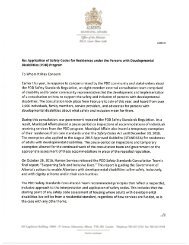In This Issue
click
click
Create successful ePaper yourself
Turn your PDF publications into a flip-book with our unique Google optimized e-Paper software.
policy require such documentation? Is<br />
this information relevant to the services<br />
you are providing? Is there a way that<br />
you and the client reach agreement<br />
about how to handle these sensitive issues<br />
in an ethical manner, meeting both<br />
client wishes and your professional<br />
obligations?<br />
As a social worker, consider what<br />
needs to be documented for you to provide<br />
safe and effective services. If you<br />
have many clients, records help you<br />
keep track of the work you are doing<br />
with each. They also allow colleagues<br />
and supervisors to follow up with a<br />
client if you take ill or are not available<br />
for other reasons. <strong>In</strong> some instances,<br />
clients may return to services after<br />
many months or years. Records allow<br />
you to refresh your memory and ensure<br />
that new services take prior assessments<br />
and experience into account.<br />
I have worked with agencies that<br />
have no documentation for clients. I<br />
have worked with agencies that have<br />
kept complete videos of all social<br />
work-client interactions, to maintain a<br />
full record of all communications and<br />
interactions. Each of these situations<br />
had reasonable ethical justifications<br />
for its approach. Some agencies that<br />
provide outreach to survivors of state<br />
torture, for instance, do not maintain<br />
documentation about the individual clients<br />
they serve. These clients have been<br />
traumatized and may not engage with<br />
any helpers who collect and record<br />
personal information. To build trust,<br />
outreach workers forgo consent forms,<br />
progress notes, and formal assessments.<br />
They may document the number of<br />
clients served and the types of services<br />
offered, but they do not maintain any<br />
identifying information. <strong>In</strong> contrast,<br />
some forensic social workers use video<br />
to ensure that they have a complete<br />
record of the information they are<br />
gathering, as well as the process used<br />
to collect the information. If their<br />
forensic evaluations are questioned<br />
in court, they are able to produce the<br />
videos. Most agencies fall somewhere<br />
between these extremes. <strong>In</strong> these situations,<br />
social workers need to make<br />
choices about what is legally required<br />
to be documented, what is important to<br />
document, how to respect client wishes,<br />
and how to respect client privacy.<br />
When in doubt about what to<br />
document, consult your supervisor or<br />
another trusted professional. As a general<br />
guide, do not put anything in your<br />
case records that you would not want a<br />
client to see. <strong>In</strong> most practice settings,<br />
clients have a right to see their records,<br />
as well as to request changes. And<br />
finally, find ways to document what is<br />
important in an honest and efficient<br />
manner. Social workers and their agencies<br />
can take the tedium out of recordkeeping<br />
by streamlining the process,<br />
using mobile technology (where appropriate),<br />
and avoiding documentation of<br />
information that does not advance the<br />
helping process.<br />
Dr. Allan Barsky<br />
is Professor of<br />
Social Work at<br />
Florida Atlantic<br />
University and<br />
former Chair of<br />
the National Ethics<br />
Committee of<br />
the National Association<br />
of Social<br />
Workers. He is<br />
the author of Ethics and Values in Social<br />
Work (Oxford University Press), Conflict<br />
Resolution for the Helping Professions<br />
(Oxford University Press), and Clinicians<br />
in Court (Guilford Press). The views<br />
expressed in this article do not necessarily<br />
reflect the views of any of the organizations<br />
with which Dr. Barsky is affiliated.<br />
The New Social Worker Winter 2017 5




